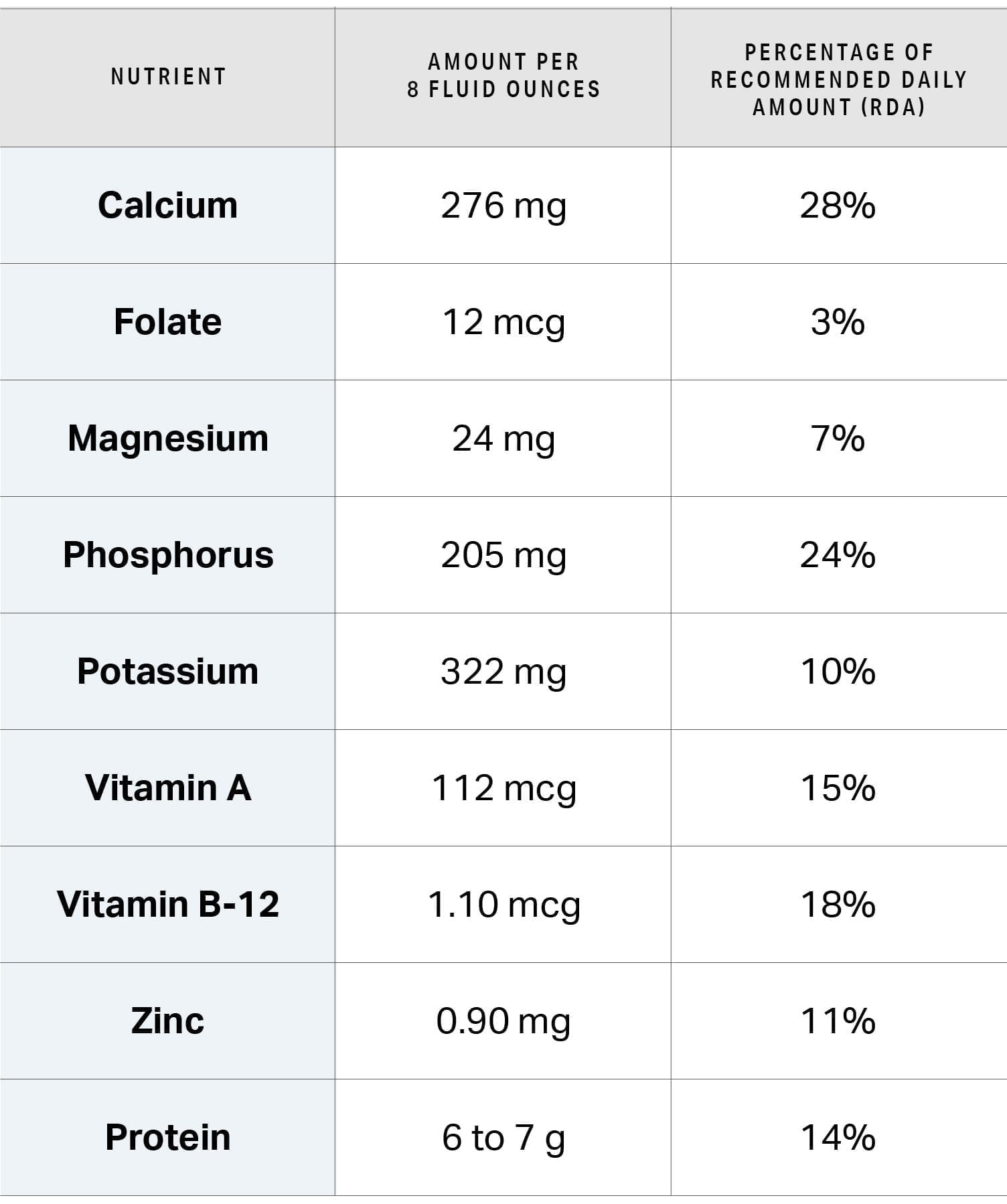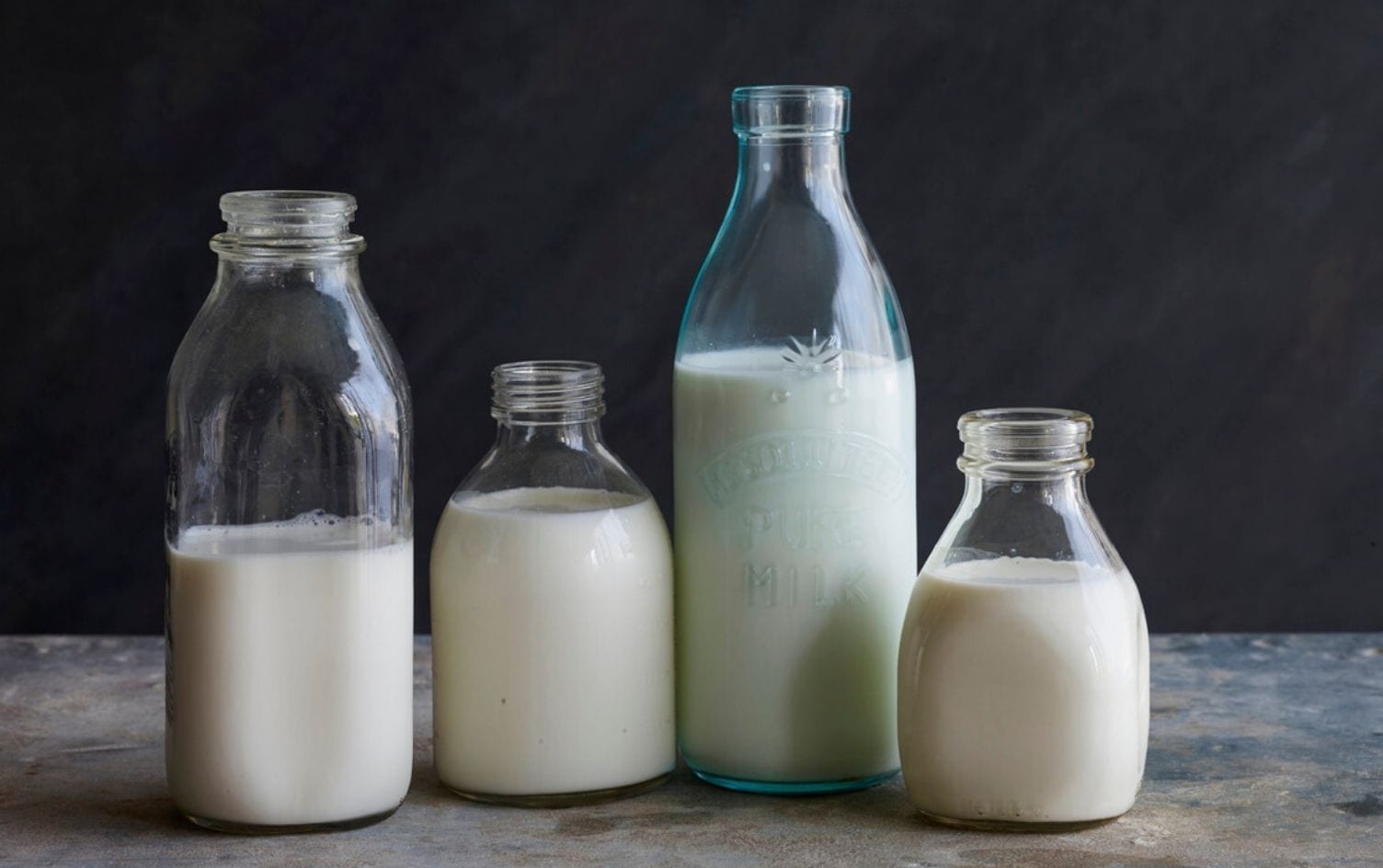There are a lot of questions these days over whether or not milk really does do a body good. Some sources tout it as an efficient way to hit our daily recommended numbers for calcium, vitamin D and protein. Other sources vilify it as an allergen, inflammatory agent and source for saturated fat.
So, who should we believe? As humans, we are unique in our partiality to dairy from infants into adulthood. But we are also unique in how we, as humans, digest milk — and a lot of that has to do not only with how our bodies evolve but also how the food industry processes, packages, prepares and manufactures dairy. A lot of details on how healthy dairy is often depends on what kind you are looking at and how exactly it was processed.
Think about it: Dairy is the only U.S. food group that almost entirely comes from one source: cows (although sheep and goat’s milk products are on the rise). At the beginning of this year, Canada de-emphasized it’s focus on dairy by removing it as a single food group and lumped it into the protein category along with meat, seafood and plant-based proteins. Regardless of whether you look at dairy as its own food group or a protein, like nearly all other foods, there are upsides and downsides when singled out as a sole category.
Yes, many people have issues with certain dairy products, in much the same way many people have issues with certain grains (wheat), certain proteins (shellfish), certain legumes (peanuts), tree nuts, soy products and eggs. However, these are all foods with extremely healthy components. People who don’t have true sensitivities can choose to add them to their plates as part of a balanced diet.
And like all of the other food groups, there may be certain forms of milk and dairy that suit you better than others. It really all depends on your needs.
THE BENEFITS
Dairy is extremely nutrient-dense. Milk contains more calcium, magnesium, phosphorus, potassium, zinc and protein per calorie than any other food in a typical diet. Calcium supports bone health (especially in growing teenagers, aging women and women who are pregnant or breastfeeding), and magnesium and potassium are key minerals in helping to control blood pressure. Dairy is rich in fat-soluble vitamins A, D and K — all fuel sources that keep our hearts, muscles and bones working properly. Milk is the highest non-meat source of B12, an energy-boosting vitamin that is extremely important for athletes and active individuals. B12 is also essential in maintaining healthy nerve cells, supporting proper brain function and assisting in making red blood cells and DNA.
To top it all off, most dairy is affordable and readily available, too.
Here are the nutritional benefits you can count on in an 8-ounce glass of milk:

DAIRY WATCHOUTS
Even with all of the benefits above, dairy doesn’t work for everyone. Many people (some 60% of us) struggle to digest cow’s milk with age. Why? As babies, our bodies produce plenty of lactase, which is needed to break down and digest lactose, the sugar found in human breast milk. This sugar is quite distinct from the sugars found in fruit, candy and chocolate.
As we are weaned, many of us lose the ability to continue producing lactase. Genetic mutation over time has enabled some of us to continue generating the lactase enzyme; this is known as a “lactose persistence” and explains why some people can go on drinking several glasses of milk every day while others must seek alternatives.
Are you one of those who are unable to digest dairy? Don’t write off if off just yet. Some lactose intolerances are actually misdiagnosed. There’s a casein protein in milk, referred to as A1, that has been shown to upset digestion and increase inflammation in the gut. Some cows only produce A2 milk, which is available in most supermarkets and labeled as such.
DAIRY ALTERNATIVES
Milk alternatives are endless in today’s market. Each week there seems to be a new plant-based milk popping up on the shelf. Most of these lack the protein and nutrient profile of regular milk, with less (if any) B12, calcium, potassium and phosphorus. If dairy is a definite don’t for you, be sure to read labels carefully and choose alternative varieties higher in calcium and protein with a minimal ingredient list. You should also be aware that milk alternatives are often highly processed with added sugars, preservatives and thickeners.
ARE SOME FORMS OF DAIRY BETTER THAN OTHERS?
As with all other food groups, yes. Not all dairy is digested equally. Fermented and cultured dairy, including kefir, yogurt, some cheeses, cultured cottage cheese and sour cream contain probiotic bacteria that breakdown most of the lactose well before it ever reaches your gut, making these products far easier to digest.
Even more important? The healthy bacteria encourages a healthier gut environment, which has been linked to better brain health, better heart health and improved immunity.
FULL-FAT OR SKIM?
The American Heart Association still recommends skim and low-fat dairy over whole — a controversial subject and hot topic in today’s media. Many researchers are beginning to find positive associations with full-fat dairy, including lower obesity rates, lower rates of cardiovascular disease and better weight control. The fats found in dairy products are quality fats that come packaged with calcium, essential nutrients and vitamins (see chart above).
A comprehensive review published in the European Journal of Nutrition found an inverse association between higher fat dairy and risk of obesity and cardiometabolic risk. Of the 16 studies evaluated, not a single one suggested lower fat dairy was any better or healthier than whole milk dairy.
Here’s the thing: When milk is skimmed to remove its lush, creamy top layer, not only is all of the fat removed, but so are all those nutritious fat-soluble vitamins. Even if vitamins A and D are added back during processing (as they often are), those vitamins don’t stand much chance for proper absorption without any fat.
Whole milk dairy products also keep you fuller, longer. While there are more calories and saturated fat associated with these richer products, as long as they are consumed in moderation and as part of a balanced healthy diet, there’s little need to fret over the extra 30 calories and 2–3 grams of saturated fat you’ll consume in choosing the 1/2 cup of whole milk kefir over the non-fat. But if you are at risk for diabetes, have a high blood lipid panel and make poor choices when it comes to a balanced diet, then lower fat dairy options may be best.
THE BOTTOM LINE
Dairy has many ways of playing a primary role in a healthy, balanced diet. It can be extremely beneficial for individuals who need more protein, calcium and probiotics in their diet. That being said, it can also be problematic for some individuals with allergies and intolerances — just be sure to find alternative sources of good, quality protein, calcium and fermented foods.
Dairy is a highly versatile category of foods and acts as a wonderful complement to other whole foods. Enjoy fresh berries and whole-grain oats with kefir or yogurt, a handful of cheese on a dark green leafy salad or a glass of milk (or golden latte!) with your egg-and-avocado toast. It’s a nutrient-dense piece of the puzzle that fits nicely onto many plates and diets. Just be a smart shopper, pay attention to labels, explore different products and keep your glass half-full (or all the way full!).




